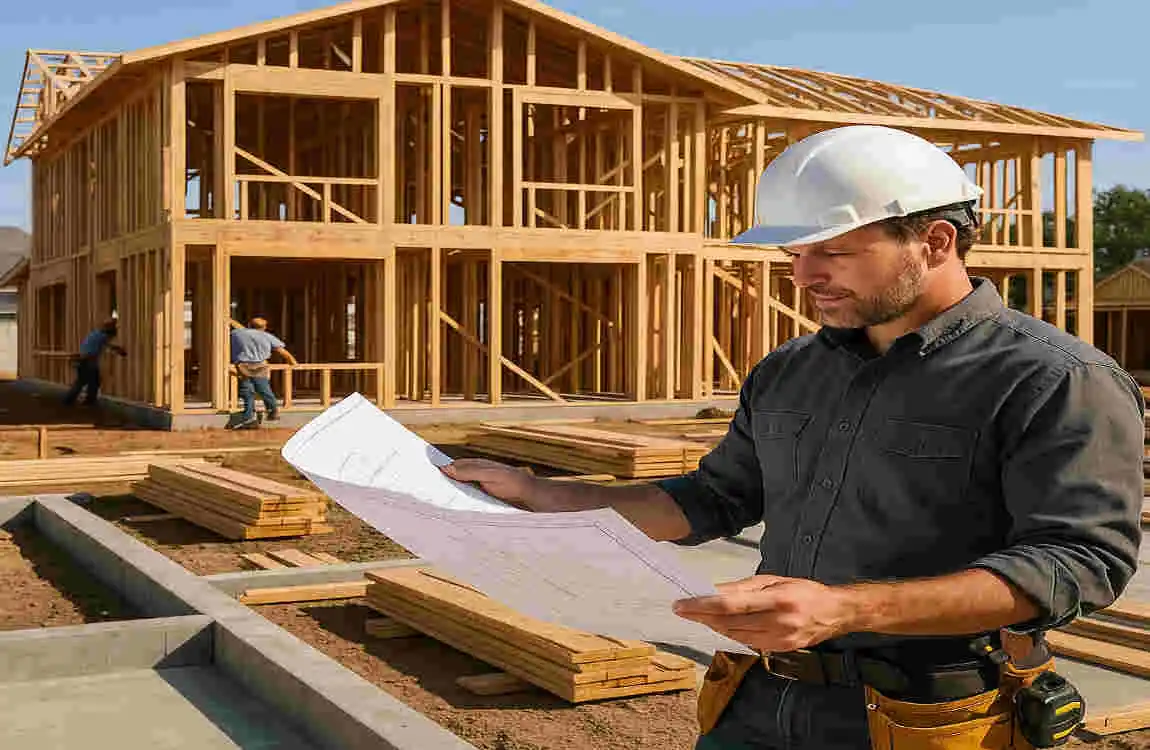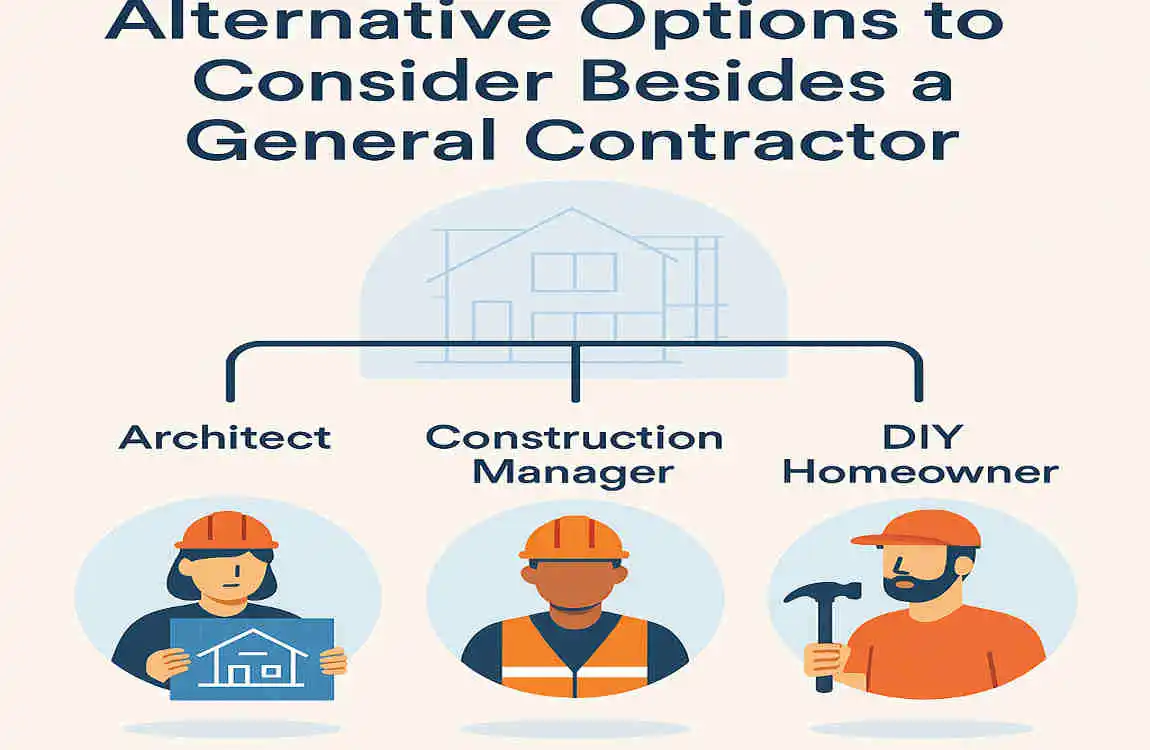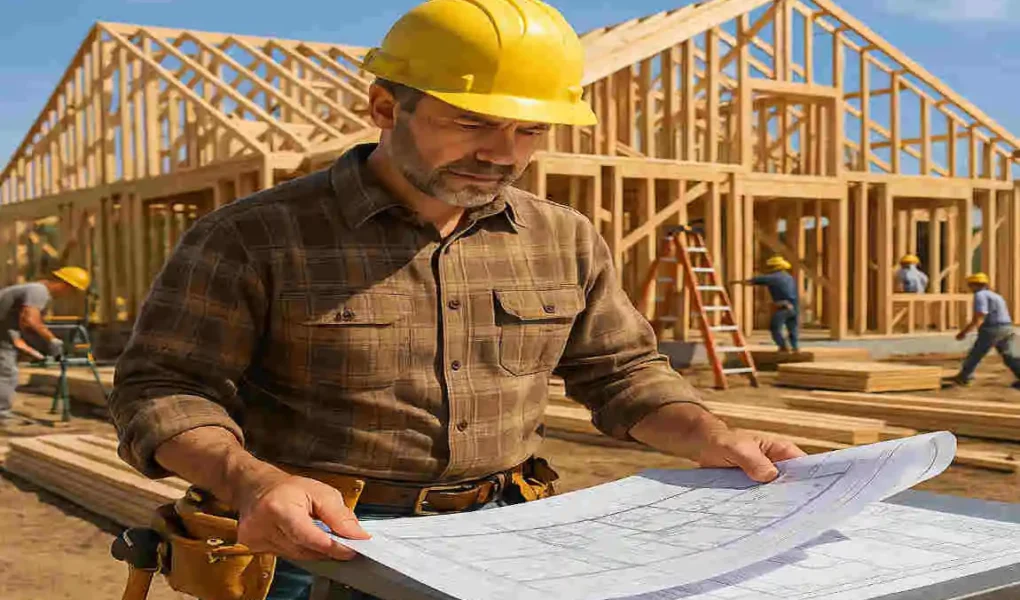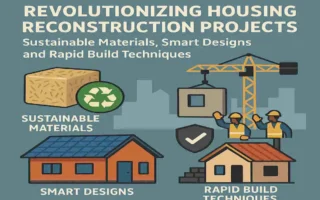A general contractor (GC) can indeed build a house. They manage the entire construction process from start to finish, hiring and overseeing subcontractors, coordinating schedules, sourcing materials, ensuring compliance with building codes, and obtaining necessary permits. In 2025, general contractors remain vital for the smooth building of new homes because they handle the complexities of managing multiple trades and compliance requirements. Costs for hiring a general contractor vary depending on factors such as location, house size, design complexity, materials, contract type (labor-only or full contract), and project duration.
What is a General Contractor?

Before we answer the burning question, let’s get to know our potential partner in this exciting journey. A general contractor is a professional who oversees and manages construction projects from start to finish. They are responsible for coordinating subcontractors, obtaining necessary permits, and ensuring that the project stays on track and within budget.
Core Responsibilities
A general contractor’s core responsibilities include:
- Project management and coordination
- Hiring and supervising subcontractors
- Obtaining permits and ensuring compliance with building codes
- Managing the project timeline and budget
- Communicating with the homeowner throughout the process
Distinction from Subcontractors and Architects
It’s essential to understand the difference between a general contractor, subcontractors, and architects. Subcontractors are specialized professionals hired by the general contractor to perform specific tasks, such as plumbing or electrical work. Architects, on the other hand, focus on the design aspect of the project and may not be involved in the actual construction process.
Common Misconceptions
There are some common misconceptions about general contractors and their role in building homes. Some people believe that a general contractor only manages the project and doesn’t actually build anything themselves. While this may be true in some cases, many general contractors have their own crews and can perform certain aspects of the construction themselves.
Why Hiring a General Contractor Matters
Hiring a general contractor for your custom home building project is crucial for several reasons. They bring experience, knowledge, and expertise to the table, ensuring that your project is completed efficiently and to your satisfaction. A general contractor can also help you navigate the complex world of building codes, permits, and regulations, saving you time and stress.
Can a General Contractor Build a House? – Direct Answer
The short answer is yes, a general contractor can build a house. They have the necessary skills, experience, and resources to manage the entire construction process, from breaking ground to handing you the keys to your new home.
General Contractor’s Capacity
A general contractor can either manage the entire construction process or physically build the house themselves, depending on their business model and the specific project requirements. They can coordinate and oversee all aspects of the construction, ensuring that everything is done correctly and to code.
Licensing and Certifications in 2025
In 2025, general contractors will still be required to hold the necessary licenses and certifications to build homes in their respective jurisdictions. These requirements may vary from state to state or even city to city, so it’s essential to work with a licensed and insured general contractor who is familiar with the local regulations.
Benefits of Hiring a General Contractor to Build Your House
There are numerous benefits to hiring a general contractor for your custom home building project. Let’s explore some of the key advantages:
Single Point of Contact
Having a general contractor as your single point of contact can make the entire process much smoother and less stressful. They will be your go-to person for any questions, concerns, or updates throughout the construction process.
Experience and Knowledge
General contractors have a wealth of experience and knowledge when it comes to building homes. They are familiar with the latest building codes, regulations, and best practices, ensuring that your home is built to the highest standards.
Efficient Coordination
A general contractor is responsible for coordinating all aspects of the construction process, from hiring subcontractors to ordering materials. This efficient coordination can help keep your project on track and within budget.
Risk Mitigation and Insurance
General contractors typically carry insurance that protects both them and you in case of any accidents or damages during the construction process. They also help mitigate risks by ensuring that all work is done correctly and to code.
Cost and Time Savings
Hiring a general contractor can save both time and money. They have the experience and resources to complete the project efficiently, and their expertise can help you avoid costly mistakes or delays.
Costs Involved When Hiring a General Contractor in 2025
When it comes to hiring a general contractor, it’s essential to understand the costs involved. Let’s break down the typical expenses you can expect in 2025:
General Contractor Fees
General contractors typically charge either a percentage of the total project cost or a fixed fee. In 2025, you can expect to pay anywhere from 10% to 20% of the total project cost as a general contractor fee, depending on the size and complexity of your project.
Factors Influencing Cost
Several factors can influence the cost of hiring a general contractor, including:
- Location: Construction costs can vary significantly depending on your location.
- Project size: Larger projects typically cost more to manage and coordinate.
- Complexity: Custom homes with unique features or designs may require more time and expertise to build.
Additional Expenses
In addition to the general contractor fee, you’ll need to budget for other expenses, such as:
- Permits and fees
- Design and architectural services
- Materials and labor
- Unexpected costs or contingencies
Budgeting Tips
To ensure that you stay within your budget, consider these tips:
- Set aside a contingency fund for unexpected expenses.
- Get multiple quotes from different general contractors to compare prices
- Work with your general contractor to prioritize your must-haves and nice-to-haves
- Be prepared to make some compromises to stay within your budget.
How to Hire the Right General Contractor in 2025
Finding the right general contractor for your custom home building project is crucial. Here’s how to go about it in 2025:
Research and Vetting
Start by researching potential general contractors in your area. Look for licensed and insured professionals with a solid reputation and positive reviews from past clients. Don’t be afraid to ask for references and follow up with them to get a better sense of the contractor’s work.
Questions to Ask
When interviewing potential general contractors, be sure to ask the following questions:
- How long have you been in business?
- What types of projects have you worked on in the past?
- Can you provide a detailed breakdown of your fees and expenses?
- How do you handle unexpected issues or delays?
- What is your communication style, and how often will you provide updates?
Checking Past Projects
Ask to see examples of the general contractor’s past projects, especially those similar to your own. This will give you a better idea of their style, quality of work, and attention to detail.
Contract Essentials
When you’ve found the right general contractor, make sure to have a detailed contract in place. The contract should include:
- A clear scope of work and timeline
- Payment terms and schedule
- Change order process for any modifications to the original plan.
- Warranty and guarantee information
- Dispute resolution process
Red Flags to Avoid
Be on the lookout for these red flags when hiring a general contractor:
- Unwillingness to provide references or past project examples
- Lack of proper licensing or insurance
- Unclear or evasive answers to your questions
- Pressure to sign a contract quickly without giving you time to review it
- A history of legal disputes or complaints from past clients
Step-by-Step Process When Building a House with a General Contractor
Now that you’ve hired the right general contractor, let’s walk through the step-by-step process of building your custom home in 2025:
Initial Consultation and Budget Planning
The first step is to sit down with your general contractor for an initial consultation. During this meeting, you’ll discuss your vision, budget, and timeline for the project. Your contractor will provide you with a rough estimate of the costs involved and help you refine your plans to fit your budget.
Design and Architectural Approvals
Once you’ve finalized your budget and plans, it’s time to move forward with the design and architectural phase. Your general contractor will work with an architect or designer to create detailed plans and drawings for your home. These plans will need to be approved by your local building department before construction can begin.
Obtaining Permits and Regulatory Compliance
With your plans approved, your general contractor will handle the process of obtaining the necessary permits and ensuring that your project complies with all local building codes and regulations. This can be a time-consuming process, but your contractor will guide you through it and keep you updated on the progress.
Construction Phase
Once all the necessary permits are in place, construction can finally begin. Your general contractor will oversee the entire construction process, coordinating subcontractors, ordering materials, and ensuring that everything is done according to plan. They will also schedule regular inspections to ensure that the work meets all necessary standards.
Communication and Updates
Throughout the construction process, your general contractor will keep you informed of the progress and any changes or issues that arise. They will provide regular updates and be available to answer any questions or concerns you may have.
Final Walk-Through and Project Completion
Once construction is complete, your general contractor will schedule a final walk-through with you to ensure that everything has been done to your satisfaction. They will address any last-minute issues or punch list items and provide you with all necessary documentation, such as warranties and guarantees.
Alternative Options to Consider Besides a General Contractor

While hiring a general contractor is the most common approach to building a custom home, there are some alternative options to consider:
Owner-Builder Approach
With the owner-builder approach, you take on the role of the general contractor yourself. This can save you money on contractor fees, but it also means taking on a significant amount of responsibility and risk. You’ll need to coordinate all aspects of the construction process, from hiring subcontractors to obtaining permits.
Design-Build Firms
Design-build firms offer a one-stop shop approach to home building. They handle both the design and construction aspects of the project, streamlining the process and potentially saving you time and money. However, design-build firms may have less flexibility when it comes to customizing your home to your exact specifications.
Multiple Subcontractors
Another option is to hire multiple subcontractors directly, without the involvement of a general contractor. This can give you more control over the project and potentially save you money, but it also means taking on the responsibility of coordinating and managing all the different trades.
When to Choose Alternatives
Alternative approaches to building a custom home may be suitable in certain situations, such as:
- If you have experience in construction and feel comfortable taking on the role of the general contractor
- If you want more control over every aspect of the project
- If you’re working with a tight budget and want to save money on contractor fees
- If you have a simple project that doesn’t require the expertise of a general contractor
Common Challenges and How to Overcome Them
Building a custom home can be an exciting but challenging process. Here are some common challenges you may face and how to overcome them:
Delays and Scheduling Conflicts
Delays and scheduling conflicts are common in construction projects. To minimize these issues, work with your general contractor to develop a realistic timeline and contingency plan. Communicate regularly and be prepared to make adjustments as needed.
Budget Overruns and Cost Control
Staying within budget can be a challenge, especially when unexpected issues arise. To control costs, work with your general contractor to prioritize your must-haves and nice-to-haves. Set aside a contingency fund for unforeseen expenses and be prepared to make some compromises if necessary.
Quality Control and Workmanship Issues
Ensuring high-quality artistry is essential when building a custom home. To address this challenge, work with a reputable and experienced general contractor who has a track record of delivering quality work. Schedule regular inspections and communicate any concerns or issues as soon as they arise.
Legal and Contractual Disputes
Legal and contractual disputes can be stressful and time-consuming. To minimize the risk of conflicts, have a clear and detailed contract in place that outlines the scope of work, payment terms, and dispute resolution process. Communicate openly and honestly with your general contractor throughout the project.
Minimizing Risks with a Good General Contractor
Hiring a good general contractor can minimize many of these common challenges and risks. A skilled and experienced contractor will have the knowledge and resources to navigate potential issues and keep your project on track. They can also help you make informed decisions and find creative solutions to any problems that arise.
Case Study: Building a Custom Home with a General Contractor in 2025
To illustrate the process of building a custom home with a general contractor in 2025, let’s take a look at a real-life case study:
The Smith Family’s Dream Home
The Smith family dreamed of building their own custom home on a beautiful piece of land they had purchased. They worked with a local general contractor to bring their vision to life.
Challenges and Solutions
During the construction process, the Smiths faced a few challenges, including:
- A delay in obtaining the necessary permits due to a backlog at the local building department. The general contractor worked with the Smiths to adjust the timeline and keep the project on track.
- An unexpected increase in the cost of materials due to supply chain issues. The general contractor helped the Smiths prioritize their budget and make some adjustments to stay within their financial constraints.
- A minor issue with the quality of work from one of the subcontractors. The general contractor quickly addressed the problem and ensured that the work was redone to the Smiths’ satisfaction.
Outcome and Lessons Learned
In the end, the Smiths were thrilled with their new custom home. They learned the importance of working with a skilled and experienced general contractor who could navigate the challenges and keep the project on track. They also realized the value of clear communication, realistic expectations, and flexibility when it comes to building a custom home.




